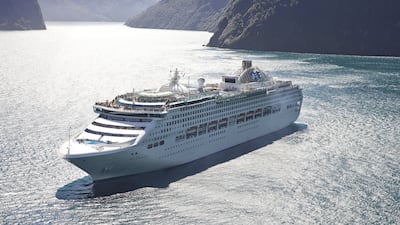Defensive equipment from sonic boom weapons that emit piercing sounds, high pressure water jets, razor wire thrown down the side of a ship to security guards firing back at pirates, have helped cruise ships safeguard holiday makers on luxury liners for more than a decade.
Security protocols have beaten back pirates in fast-moving skiffs armed with AK-47s, grappling hooks and light-weight ladders since a rise in attacks in the late 1990s when merchant vessels were first hijacked and crew taken hostage.
The protective measures on cruise ships came into focus this week when holidaymakers were taken aback by piracy drills on a recent 104-day Sea Princess sailing from Sydney to Dubai, which included a 10-day dusk-until-dawn dimming of lights and a shutdown of all parties on deck.
As The National has reported on extensively, a bleak economic situation in Somalia is among the causes of a spike in hijackings this year.
In response to questions about whether this was in response to specific threats, the Princess Cruises said it was cautionary measure.
“We do not discuss specific security procedures or equipment on our vessels. In addition to our normal ongoing security training, additional piracy specific training is conducted prior to any of our vessels entering areas of concern,” said Brian O’Connor, vice president public relations of Princess Cruises.
“Any measures aboard Sea Princess were simply taken out of an abundance caution and not in response to a specific concern. The safety and security of our guests and crew is our number one priority.”
While cruise companies declined to give details, experts said similar to merchant vessels in piracy infested waters, cruise ships too increase vigilance, step up watch-keeping using night vision binoculars and can deploy water cannons or fire hoses if threatened as per the best management practices adopted by the shipping industry.
__________
Special report:
__________
Pottengal Mukundan, director of the International Maritime Bureau, said all vessels should at the very minimum follow listed best management practices when transiting through the Arabian Sea and Gulf of Aden.
“Generally cruise ships have higher standards of anti-piracy measures than those followed by many other merchant vessels. The precise measures will depend upon particular company policies and their risk assessment,” he said.
Anti-piracy measures are followed by cruise liners when they pass through the Gulf of Aden and the Indian Ocean high risk areas, said Michael Edey, head of operations at Dryad Maritime.
Apart from a ship specific security plan, the standard procedures followed includes the advice that a ship inside the high risk area “only use navigation lights and extinguish all other external lighting,” he said.
The speed of cruise ships was the main deterrent.
“The main advantage for cruise ships over other types of ships are their speed. While it will not prevent the ship having an interaction with small boats that may contain pirates, a cruise ship travelling at 20plus knots is unlikely to be boarded successfully,” Mr Edey said.
Although experts usually advice against armed guards or weapons aboard passenger ships, they acknowledge that to protect more than 2,000 passengers, cruise ships employ security to deter hijackers.
“Armed guards should only be used on ships that are considered at such a high risk that the standard best management practices protective measures are insufficient to mitigate the risk,” Mr Edey said
“Armed guards are used by some companies usually to reassure the passengers that they have armed protection onboard.”
_________
Read more
_________
Peter Cook, director of maritime consultancy PCA Maritime Ltd said while some companies did use armed guards, it was not standard practice.
“Privately contracted armed security personnel have been used on some cruise liners over the past years that pirates have been active in the Indian Ocean and no ship of any type has successfully been hijacked with armed guards embarked.
“Some cruise liner companies are more prepared to use guards than others, indeed some firms have let it be known that armed guards are embarked to reassure the passengers,” Mr Cook said.
Warnings on the public address system alerting passengers to take cover below deck when armed pirates in fast-moving skiffs have been spotted alongside cruise ships can be seen in online videos and reports going back to 2005, when luxury ships were chased and shot at by pirates off Somalia, the Gulf of Aden and off the Seychelles coast.
Michael J McGarry, senior vice president, public affairs of the Cruise Lines International Association, said in case of “security or safety concern, cruise ships have the flexibility to alter their itineraries as needed to avoid areas of potential risk.
“Cruise lines do coordinate closely with national and international security and law enforcement authorities around the globe,” he said.


